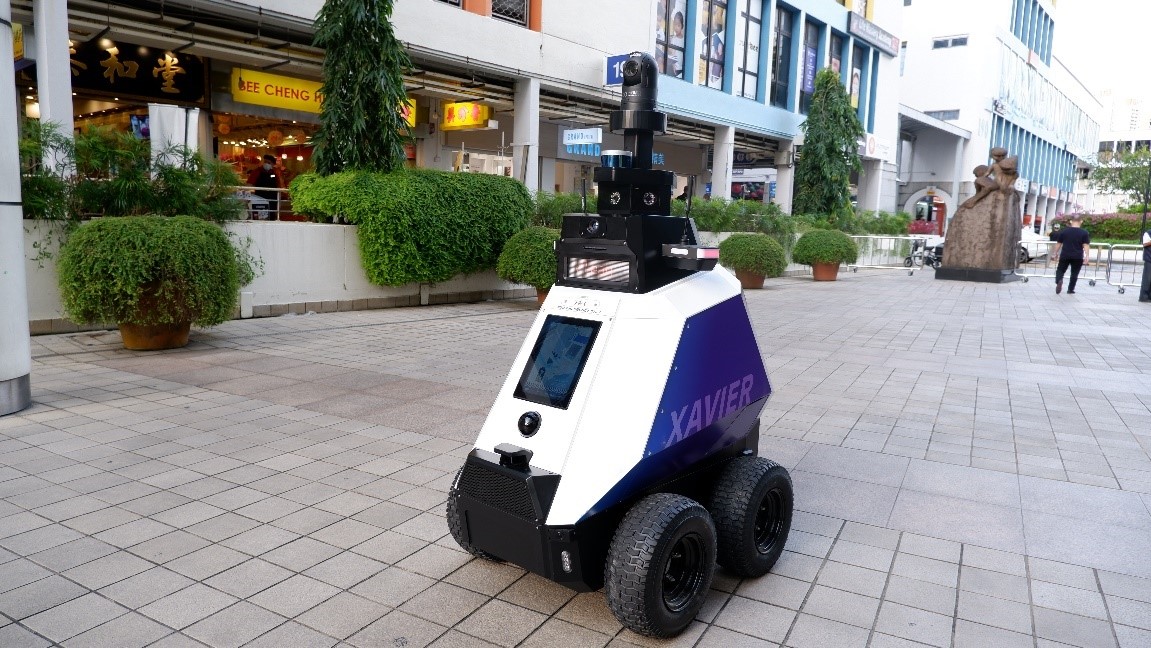
Xavier the ground robot patrolling Toa Payoh Central in Singapore. PHOTO: Home Team Science and Technology Agency handout
As I walked with my kids around the Sengkang Floating Wetland park over the weekend, I noticed not for the first time a chap with his fishing rod and a line planted into the water, right next to a “no fishing” sign.
Something was different this time. Soon, I heard a serious-sounding voice over the speakers. Fishing is not allowed here, it warned, and the chap took his hobby somewhere else.
No surprise there for me, because I had written about how the authorities were analysing the video feed from cameras and drones in Singapore’s waterways to monitor water quality as well as catch offenders.
This time round, I told my kids, it was a good thing the warning came automatically, without the need for any enforcement officers to drop by.
At the same time, I also quietly thought to myself if we had subconsciously taken a step closer to a surveillance society.
You know, one where people are so easily monitored by machines and robots and where AI could be used to send out automated warnings and fines for anything from illegal fishing to not keeping a safe distance?
Yes, rather like the Orwellian social credit system that China introduced in 2014. Use expired train tickets or smoke on a train, for example, and you get a poor rating so you can’t buy train or plane tickets.
Fortunately, there’s no such social credit system in Singapore today. But over the weekend, a robot name Xavier was introduced in the Toa Payoh heartlands to patrol for “undesirable social behaviours”.
As part of a trial, this wheeled robot stuffed with cameras and sensors will look out for people parking their bicycles illegally or those smoking in prohibited areas, for example.
My first reaction was to applaud this. Frankly, having a robot do the somewhat unpleasant job of confronting these casual offenders is much easier and more efficient than deploying dozens of officers on foot.
Besides smokers and riders, I can think of another group that should be confronted by these non-human upholders of good social behaviour – those who refuse to mask up.
I’ve personally witnessed groups of people hanging around in the void deck, with masks pulled down and talking at the top of their voices about all the big and important things happening in the world.
How good it would be for a robot like Xavier to turn up and ask them to mask up – as frequently as needed.
Would this be better than a neighbour sending a report on these offenders? Possibly, so, because of how efficient machines can be in carrying out repetitive tasks.
Yet, therein also likes the problem as well. It is important that these machines are not just efficient but also transparent in taking on their tasks.
Transparent in the sense that people they interact with can “see” the authority that the machines represent, not just a faceless robot that is barking orders at them.
In other words, it has to be clear to people that these machines are mere extensions of the authorities, be it the Ministry of Health trying to manage crowds during a pandemic or the Public Utilities Board telling people not to fish illegally.
If that is lost, the overbearing sense of being lorded over by a machine is all too apparent. With the limited interactivity that these robots and AI can offer now, there is just a lack of nuance at times that call for it.
Think about some of the difficult jobs that police officers on the beat carry out each day, say, diffusing an angry confrontation.
Then there are safe distancing ambassadors, who have to use their persuasion skills frequently to get people to wear their masks or keep to small groups.
Of course, you could argue that someone like the former naval officer who refused to put on a mask repeatedly and made life difficult for safe distancing ambassadors would do well to be taken to task by a robot instead.
However, you wonder if fear and punishment will yield the desired results in the long term. Think about the fines we have had in Singapore over the years for littering and other offences.
What we have today is a cleaned city, one maintained by an army of mostly foreign labourers. This is not the same as, say, Japan, a clean country where kids are taught from young to bring their trash home and dispose of it properly.
You could argue that, unfortunately, negative encouragements seem to work better in Singapore. In other words, the stick rather than the carrot.
If not, why do we still need to threaten fines for something as simple as returning one’s plates and trays at hawker centres?
As more robots are deployed to enforce such compliance in future, you wonder if people will see these robots and AI in our midst as the embodiment of what a “fine” city Singapore is.
Will the enforcement become so much more efficient yet further removed from its reason and intent? That will be a sad day.






